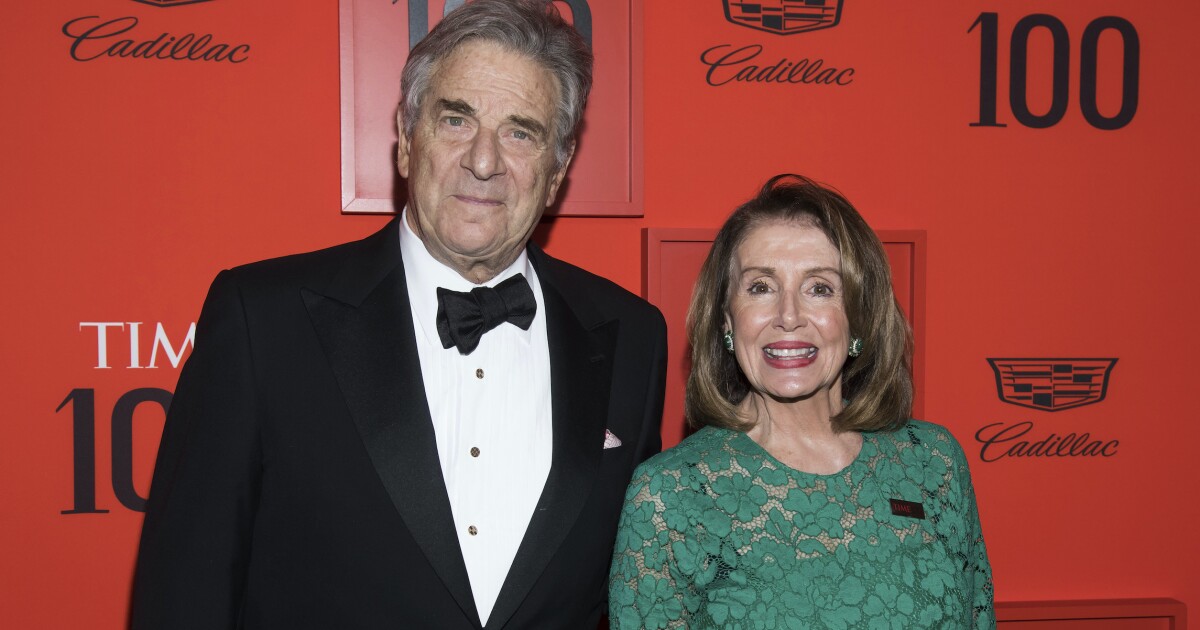

Paul Pelosi’s lucrative purchase of stock in a semiconductor company just before Congress considered providing subsidies to the industry has provided weeks of negative headlines for House Speaker Nancy Pelosi — and it isn’t the first time her husband’s investments have caused headaches for his powerful wife.
A number of other transactions executed by Paul Pelosi have raised eyebrows over the years for intersecting uncomfortably with the work Nancy Pelosi has pursued in the House.
The latest dust-up over semiconductor stocks has renewed bipartisan interest in a bill to limit the ability of lawmakers to trade stock in companies they regulate.
Nancy Pelosi previously opposed bans on stock trading for members of Congress and has offered only tepid support for the concept even as scrutiny of her husband’s wealth grows.
Paul Pelosi’s investing portfolio outperforms the market, and his picks have gained such a reputation for generating success that traders can now follow his investments on an app if they wish to mimic his stock purchases.
Here are a handful of times Paul Pelosi’s investments have spawned bad press for Nancy Pelosi.
SEMICONDUCTOR SCANDAL
Paul Pelosi’s purchase of up to $5 million worth of stock in Nvidia, a major semiconductor manufacturer, just before Congress moved ahead with a vote on providing subsidies to the domestic semiconductor industry drew outrage earlier this month.
Following the public outcry, Paul Pelosi sold shares this week at a loss as the chips bill moved forward, although whether they have any remaining position in the company remains unknown due to some ambiguity in disclosure laws. Lawmakers and their spouses are typically required to report income from investments only in ranges that obscure their exact value.
It wasn’t the first time Paul Pelosi had invested in a semiconductor company as momentum built behind congressional funding for the industry, which produces computer chips needed for a broad range of technology.
Paul Pelosi purchased stock in Micron, another semiconductor company, in December of last year as advocates pushed Congress to pass legislation that is now advancing on Capitol Hill. The Chamber of Commerce, for example, had called on Congress to pass semiconductor subsidies less than a month before Paul Pelosi made the purchase in Micron.
BIG BETS ON BIG TECH
One week after the House Judiciary Committee advanced antitrust measures aimed at major technology corporations, Paul Pelosi sunk millions of dollars into stock in Amazon, Apple, and Alphabet, Google’s parent company.
Those bills, which would rein in the power of the companies in which Paul Pelosi invested, have never become law. Efforts to push the legislation in the Senate have lost momentum heading into the midterm elections.
While Nancy Pelosi has publicly professed support for the antitrust bills, she has reportedly slow-walked them in the House, where they’ve sat on the back burner for a year.
Paul Pelosi’s Big Tech investment on the heels of a committee vote concerning the industry drew attention, but Nancy Pelosi’s office told Fox Business at the time that she had “no involvement or prior knowledge of these transactions” and did not personally own any stock.
REALITY CHECK ON MICROSOFT
Paul Pelosi’s more than $3 million purchase of stock in Microsoft last year came before two key pieces of news that drove the price of his shares up significantly and once again threw the spotlight on his relationship with one of Washington’s most powerful people.
On March 19 of last year, Paul Pelosi made the Microsoft investment. On March 31, less than two weeks later, the Army announced it had signed a massive $22 billion contract with Microsoft to purchase augmented reality headsets from the company.
“Microsoft shares moved higher after the announcement,” CNBC reported at the time. “The stock was up 1.7% to $235.77 per share at the end of Wednesday’s trading session.”
In April, Microsoft unveiled a deal to purchase Nuance Communications, a company making speech recognition technology, for $19 billion — a signal to investors that Microsoft was looking to expand. Microsoft’s shares rose on the news.
TESLA TURBULENCE
Paul Pelosi invested $1 million into electric car maker Tesla in December 2020 via stock options.
Several weeks later, President Joe Biden announced a plan to replace the federal government’s fleet with electric cars.
The sequence of events caused many observers to question whether the House speaker’s husband had any advance knowledge of the executive order before he made a financial bet on the country’s biggest electric car manufacturer.
Biden had not, at the time, specified whether the government would purchase the electric cars from Tesla. And the politics surrounding Tesla, given the recent ideological transformation of its leader, Elon Musk, have changed since Paul Pelosi made the stock purchase.
But Paul Pelosi’s investments in Tesla again renewed calls for stricter oversight of congressional trades in March, when he spent $2.2 million buying the shares he secured the rights to purchase with his options.
VISA PURCHASE
Paul Pelosi’s purchase of hot Visa stock in 2008 was so controversial that it became the subject of a 60 Minutes episode highlighting the possible ethical problems with stock trading in Congress.
As Democrats in Congress were at the time considering regulations for the credit card industry, Paul Pelosi was invited to participate in an initial public offering for Visa that year that allowed him to purchase stock that was, at the time, limited to a select few investors. He snapped up some shares.
CLICK HERE TO READ MORE FROM THE WASHINGTON EXAMINER
Later, Nancy Pelosi was accused of slow-walking legislation that would stop Visa and other credit card companies from issuing swipe fees to vendors.
While the bill eventually passed, the length of time it took for the bill to advance and the totality of the measures Visa employed to try to lobby Nancy Pelosi to kill it caused some to question whether Paul Pelosi was invited to participate in the IPO as part of an influence effort.






